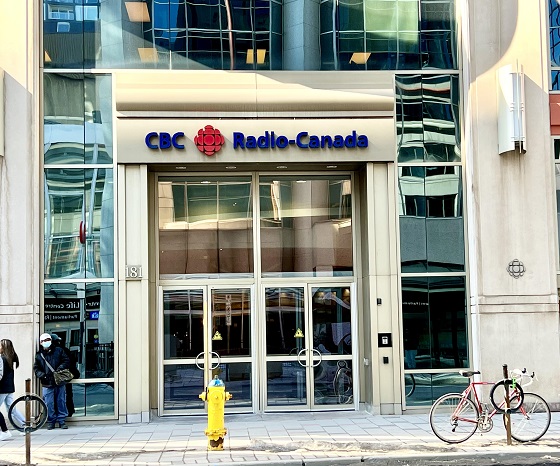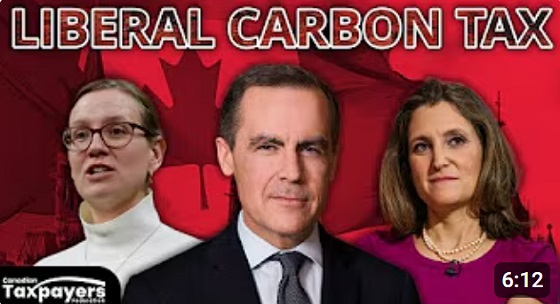Business
Trudeau government wants to give CBC more money

From the Canadian Taxpayers Association
By Kris Sims
The CBC used to air The Simpsons after school.
One of the best episodes was the Cape Fear homage where an FBI agent is trying to change Homer’s last name to Thompson.
After hours of explanation, the kids have fallen asleep, Marge has given up and the agent says, “When I step on your foot and say: ‘Hello Mr. Thompson,’ you nod your head! Got it?!”
Homer did not get it.
The Liberal members of Parliament on the heritage committee still don’t get it either.
The committee has sent a report to the House of Commons urging the government to give the CBC even more money.
“That the Government of Canada provide a substantial and lasting increase in the parliamentary appropriations for CBC/Radio-Canada, allowing it to eliminate its paid subscription services and gradually end its reliance on commercial advertising revenues,” reads the report.
Really? More money? The CBC already takes $1.4 billion year from taxpayers. And that’s not enough?
That amount of money could already cover the salaries of about 7,000 police officers and 7,000 paramedics.
If Trudeau’s MPs want to give the CBC more money so that it can get rid of its advertising and subscription funding, that means a huge cost for taxpayers.
According it’s latest annual report, the CBC collected about $493 million in revenue other than government funding in 2023-24, the bulk being subscription fees and advertising.
This means these Trudeau government MPs want taxpayers to fund the CBC to the tune of about $2 billion per year.
This is the opposite of what needs to happen.
The CBC should be defunded for three key reasons.
The CBC is a huge waste of money, nearly nobody is watching it and journalists should not be paid by the government.
The committee knows this.
And we know they know because the Canadian Taxpayers Federation told them to their faces in testimony before the committee.
CBC CEO Catherine Tait repeatedly testified at the committee and each time she inadvertently made a stronger case to defund the CBC, due to her entitlement and lack of accountability.
Tait refused to say if she will take a severance when she leaves the CBC next year, claiming it’s a personal matter.
It’s not personal if it’s taxpayers’ money.
Documents obtained by the Canadian Taxpayers Federation show Tait is paid between $460,000 and $551,000 this year, with a bonus of up to 28 per cent.
That’s a bonus of up to $154,448. That’s more than the average Canadian family earns in a year.
Just before Christmas last year, Tait cried broke to the committee and afterwards the CBC announced lay offs in its newsrooms.
Documents obtained by the CTF show the CBC handed out big bonuses that year anyway, costing taxpayers $18 million.
As the CBC fan group Friends of Canadian Media put it: “This decision is deeply out of touch and unbefitting of our national public broadcaster.”
It gets worse because the state broadcaster isn’t even doing a good job.
According to the CBC’s latest quarterly report, CBC News Network’s national audience share is 1.7 per cent.
Documents obtained by the CTF show the CBC’s supper hour newscast drawing microscopic audiences, with 0.7 per cent of Toronto watching the six o’clock news on CBC.
Journalists should not be paid by the government because it’s an obvious conflict of interest.
You can’t hold the powerful government to account if you’re counting on that government for your paycheque.
Such government funding of media has contributed to the rapid erosion of trust in the news media, with 61 per cent of Canadians saying they think journalists are “purposely trying to mislead people by saying things they know are false or gross exaggerations.”
CBC’s entertainment programming barely fares better. The Murdoch Mysteries, which is not produced by the CBC, pulls in its biggest audience with about 1.9 per cent of the population watching.
The politicians on the committee know all of this, and yet, like Homer Simpson, they are not getting the message.
If the CBC needs money, it should earn that money itself.
Taxpayers can’t afford the state broadcast’s bill now, let alone hundreds of millions more.
It’s time to defund the CBC.
Kris Sims is the Alberta Director for the Canadian Taxpayers Federation and a former member of the Parliamentary Press Gallery.
2025 Federal Election
MEI-Ipsos poll: 56 per cent of Canadians support increasing access to non-governmental healthcare providers

-
Most believe private providers can deliver services faster than government-run hospitals
-
77 per cent of Canadians say their provincial healthcare system is too bureaucratic
Canadians are increasingly in favour of breaking the government monopoly over health care by opening the door to independent providers and cross-border treatments, an MEI-Ipsos poll has revealed.
“Canadians from coast to coast are signalling they want to see more involvement from independent health providers in our health system,” explains Emmanuelle B. Faubert, economist at the MEI. “They understand that universal access doesn’t mean government-run, and that consistent failures to deliver timely care in government hospitals are a feature of the current system.”
Support for independent health care is on the rise, with 56 per cent of respondents in favour of allowing patients to access services provided by independent health entrepreneurs. Only 25 per cent oppose this.
In Quebec, support is especially strong, with 68 per cent endorsing this change.
Favourable views of accessing care through a mixed system are widespread, with three quarters of respondents stating that private entrepreneurs can deliver healthcare services faster than hospitals managed by the government. This is up four percentage points from last year.
Countries like Sweden and France combine universal coverage with independent providers and deliver faster, more accessible care. When informed about how these health systems run, nearly two in three Canadians favour adopting such models.
The poll also finds that 73 per cent of Canadians support allowing patients to receive treatment abroad with provincial coverage, which could help reduce long wait times at home.
Common in the European Union, this “cross-border directive” enabled 450,000 patients to access elective surgeries in 2022, with costs reimbursed as if they had been treated in their home country.
There’s a growing consensus that provincial healthcare systems are overly bureaucratic, with the strongest agreement in Alberta, B.C., and Quebec. The proportion of Canadians holding this view has risen by 16 percentage points since 2020.
Nor do Canadians see more spending as being a solution: over half say the current pace of healthcare spending in their province is unsustainable.
“Governments shouldn’t keep doubling down on what isn’t working. Instead, they should look at what works abroad,” says Ms. Faubert. “Canadians have made it clear they want to shift gears; now it’s up to policymakers to show they’re listening.”
A sample of 1,164 Canadians aged 18 and older was polled between March 24th and March 28th, 2025. The margin of error is ±3.3 percentage points, 19 times out of 20.
The results of the MEI-Ipsos poll are available here.
* * *
The MEI is an independent public policy think tank with offices in Montreal, Ottawa, and Calgary. Through its publications, media appearances, and advisory services to policymakers, the MEI stimulates public policy debate and reforms based on sound economics and entrepreneurship.
2025 Federal Election
POLL: Canadians say industrial carbon tax makes life more expensive

The Canadian Taxpayers Federation released Leger polling showing 70 per cent of Canadians believe businesses pass on most or some of the cost of the industrial carbon tax to consumers. Meanwhile, just nine per cent believe businesses pay most of the cost.
“The poll shows Canadians understand that a carbon tax on business is a carbon tax on Canadians that makes life more expensive,” said Franco Terrazzano, CTF Federal Director. “Only nine per cent of Canadians believe Liberal Leader Mark Carney’s claim that businesses will pay most of the cost of his carbon tax.
“Canadians have a simple question for Carney: How much will your carbon tax cost?”
The federal government currently imposes an industrial carbon tax on oil and gas, steel and fertilizer businesses, among others.
Carney said he would “improve and tighten” the industrial carbon tax and extend the “framework to 2035.” Carney also said that by “changing the carbon tax … We are making the large companies pay for everybody.”
The Leger poll asked Canadians who they think ultimately pays the industrial carbon tax. Results of the poll show:
- 44 per cent say most of the cost is passed on to consumers
- 26 per cent say some of the cost is passed on to consumers
- 9 per cent say businesses pay most of the cost
- 21 per cent don’t know
Among those decided on the issue, 89 per cent of Canadians say businesses pass on most or some of the cost to consumers.
“Carbon taxes on refineries make gas more expensive, carbon taxes on utilities make home heating more expensive and carbon taxes on fertilizer plants increase costs for farmers and that makes groceries more expensive,” Terrazzano said. “A carbon tax on business will push our entrepreneurs to cut production in Canada and increase production south of the border and that means higher prices and fewer jobs for Canadians.”
-

 2025 Federal Election2 days ago
2025 Federal Election2 days agoNo Matter The Winner – My Canada Is Gone
-

 2025 Federal Election2 days ago
2025 Federal Election2 days agoASK YOURSELF! – Can Canada Endure, or Afford the Economic Stagnation of Carney’s Costly Climate Vision?
-

 Alberta2 days ago
Alberta2 days agoMade in Alberta! Province makes it easier to support local products with Buy Local program
-

 2025 Federal Election2 days ago
2025 Federal Election2 days agoCSIS Warned Beijing Would Brand Conservatives as Trumpian. Now Carney’s Campaign Is Doing It.
-

 2025 Federal Election1 day ago
2025 Federal Election1 day agoInside Buttongate: How the Liberal Swamp Tried to Smear the Conservative Movement — and Got Exposed
-

 Alberta2 days ago
Alberta2 days agoProvince to expand services provided by Alberta Sheriffs: New policing option for municipalities
-

 Bruce Dowbiggin1 day ago
Bruce Dowbiggin1 day agoIs HNIC Ready For The Winnipeg Jets To Be Canada’s Heroes?
-

 Dr. Robert Malone1 day ago
Dr. Robert Malone1 day agoThe West Texas Measles Outbreak as a Societal and Political Mirror








